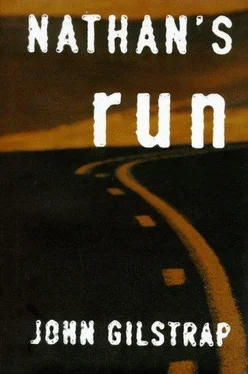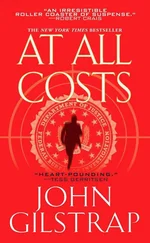John Gilstrap - Nathan’s Run
Здесь есть возможность читать онлайн «John Gilstrap - Nathan’s Run» весь текст электронной книги совершенно бесплатно (целиком полную версию без сокращений). В некоторых случаях можно слушать аудио, скачать через торрент в формате fb2 и присутствует краткое содержание. Город: New York, Год выпуска: 1997, ISBN: 1997, Издательство: Grand Central Publishing, Жанр: Триллер, на английском языке. Описание произведения, (предисловие) а так же отзывы посетителей доступны на портале библиотеки ЛибКат.
- Название:Nathan’s Run
- Автор:
- Издательство:Grand Central Publishing
- Жанр:
- Год:1997
- Город:New York
- ISBN:978-0446604680
- Рейтинг книги:3 / 5. Голосов: 1
-
Избранное:Добавить в избранное
- Отзывы:
-
Ваша оценка:
- 60
- 1
- 2
- 3
- 4
- 5
Nathan’s Run: краткое содержание, описание и аннотация
Предлагаем к чтению аннотацию, описание, краткое содержание или предисловие (зависит от того, что написал сам автор книги «Nathan’s Run»). Если вы не нашли необходимую информацию о книге — напишите в комментариях, мы постараемся отыскать её.
Nathan’s Run — читать онлайн бесплатно полную книгу (весь текст) целиком
Ниже представлен текст книги, разбитый по страницам. Система сохранения места последней прочитанной страницы, позволяет с удобством читать онлайн бесплатно книгу «Nathan’s Run», без необходимости каждый раз заново искать на чём Вы остановились. Поставьте закладку, и сможете в любой момент перейти на страницу, на которой закончили чтение.
Интервал:
Закладка:
Within a week after she’d started her new career, Denise’s salary had been quintupled, in return for her signature on an unheard-of three-year exclusive contract. The Bitch represented everything that is supposed to fail in radio: a black female who speaks openly and evenly about everything from racism to child-rearing. Politically, she was more conservative than liberal, but she didn’t hesitate to torpedo anyone who stepped out of line.
Three weeks after her first show, NewsTalk 990 had picked up a full six percentage points in the ratings during the coveted morning slot. Denise the Bitch had been featured in both Washington, D. C. newspapers, and thoroughly dominated the trade press. According to her fans, The Bitch offered a real person’s view on life. Like most Americans, Denise had no political ax to grind, and she certainly had no political ambitions, so when she said what she thought, it had the ring of truth with which her audience could identify.
One month after her first anniversary as a talk-show host, Enrique Zamora sat her down in his office, looking like a little kid who was going to burst if he didn’t reveal a secret. “I overheard the station manager talking with some guy on the phone today. They’re going to syndicate us!”
Even as Denise heard the words, she didn’t understand his enthusiasm. “So?”
“So! Don’t you get it? Syndication means we’ll be on the radio in every major market in the country. A nationwide audience.”
For a long moment, Denise had just stared in disbelief, her hand frozen over her gaping mouth. “Oh, my God, Rick. Are you serious?”
“Yes, I’m serious! Think of it. Millions of people listening to you from coast to coast. Millions of dollars in your pocket.”
Enrique’s last comment took Denise’s breath away, making her feel light-headed. “No,” she commanded, mostly to herself. “We’re not going to get all excited over something you think you heard other people talking about. This kind of thing just doesn’t happen to me.”
“I don’t think I overheard it,” Enrique protested. “I know what I heard, and they were talking about you.”
“And they said we were going into syndication?”
“Yes.”
“You’re a liar.”
Enrique laughed. “I am not a liar. I’m a busybody and an eavesdropper, but I am not a liar.”
Sure enough, later that day, the station manager approached Denise with the official news. Their initial syndication would be in twelve markets, from Tampa to Bloomington, Illinois. Her already comfortable salary would double once again. Within a year, there were thirty-four stations on the network, prompting another doubling of her salary.
By the time Nathan listened to her for the first time in the bedroom of a strange house, Denise was being heard on 327 stations across the country, and was earning well into seven figures.
During her monologue at the beginning of the show that morning, The Bitch had railed against the state of the youth of America, citing as an example of the decaying moral fabric the local Washington story of a twelve-year-old boy who’d escaped from prison after killing a guard.
“The prosecutor on this case says he’s going to try this kid as an adult, and I think that’s great. How many times do you hear stories of gang killings, and drive-by killings and robbery killings, only to find out that the killing is being done by pint-sized monsters? Twelve-, thirteen-, fourteen-year-olds who have so little to live for that they take the most precious possession from others—their very lives.
“I for one am tired of hearing it. I for one am prepared to stand up and say, man or woman, underage or not, if you intentionally take the life of another human being, I don’t want you as a part of my society. I want you in prison for the rest of your life, or certainly until you’re old enough to be strapped down in one of those nice little electric chairs they have collecting dust across the country, where you can be zapped straight to hell, and spend all eternity considering just how cool and courageous murder really is.”
The phones went nuts, every light blinking urgently by the time she was done with her tirade. Promising to talk to the listeners on hold as soon as she came back, The Bitch went into commercials.
“Half the calls want to hang the kid, and the other half want to hang you,” Enrique said into Denise’s headset. She smiled stunningly. To Enrique, everything that Denise did was stunning. Always well dressed and always wearing makeup, Denise was a sharp contrast to the rest of the on-air talent, whose sense of fashion focused mainly on using a napkin rather than their sleeves to wipe their mouths during lunch. Fans who knew Denise only from her voice invariably commented, when they met her, on how beautiful she was, and, privately, how surprised they were.
Denise raised her onyx eyes from her notes to stare through the glass at Enrique. “Listen, Rick,” she said. “Screen out the callers who want to tell me that the kid is innocent, okay?” Enrique nodded and gave a thumbs-up. “And I don’t want to talk to anyone who’s going to tell me that I’m a bad mother. I just want to discuss the pros and cons of trying kids as adults, and proposed solutions to the juvenile crime problem.”
“You got it, Denise,” Enrique told her. “We’re coming out of commercial in twenty seconds. Your first call is Robert on line four. I think he wants to agree with you.”
Denise nodded with mock enthusiasm. “That sounds like a perfect place to start.”
Enrique used his fingers to count down from five, and then gave Denise her cue.
“And you’re back in the room with The Bitch. Not much trouble collecting phone calls this morning.” She stabbed the blinking line four. “Hello, Robert, this is The Bitch. What’s on your mind?”
“Hello, Bitch.” Robert’s voice had the gravelly sound of a smoker, maybe forty-five years old. “I’m calling to agree with you, believe it or not.”
“Why wouldn’t I believe that? Since I’m always right, I always expect people to agree with me.”
Robert laughed, initiating a juicy cough. “But this is the first time I’ve ever agreed with you.”
Denise laughed, too. “Well, tell me, Robert, what have I said to deserve such an honor?”
“I say the youth of America are going down the toilet. I get sick and tired of hearing that abusive families and racial strife are responsible for kids’ actions. It’s the kids themselves. They don’t respect anybody or anything; they just look at everybody as their next potential victim:’
“You keep referring to ‘they’, Robert. Who exactly are ‘they?’”
“The juvenile delinquents out on the street. The courts are afraid to do anything about them. If they throw them in prison, the ACLU screams that they’re not being treated fairly, and the media paints this picture of an innocent who’s been victimized by his surroundings. On the other hand, if the judges don’t put them in jail, that means they just come back out onto the street.”
Denise tried to interrupt, but Robert was on a roll.
“I read a story in the paper just a few months ago about some kid in Chicago, eleven years old, who killed a girl in a drive-by shooting. I was in Chicago at the time, and all we heard was how they were looking for this kid, who had an arrest record as long as my arm. Two days later, the kid showed up dead in some drainage ditch, shot in the head. Then the local media cried all over themselves, showing the kid’s smiling face on the news and interviewing his relatives about what a wonderful kid he was!”
“And you don’t believe he was a wonderful kid?”
“Hell, no. He was scum. Let’s call it as it is. He might have been young scum, but he was scum. We’ve got no place for people like that on the streets.”
Читать дальшеИнтервал:
Закладка:
Похожие книги на «Nathan’s Run»
Представляем Вашему вниманию похожие книги на «Nathan’s Run» списком для выбора. Мы отобрали схожую по названию и смыслу литературу в надежде предоставить читателям больше вариантов отыскать новые, интересные, ещё непрочитанные произведения.
Обсуждение, отзывы о книге «Nathan’s Run» и просто собственные мнения читателей. Оставьте ваши комментарии, напишите, что Вы думаете о произведении, его смысле или главных героях. Укажите что конкретно понравилось, а что нет, и почему Вы так считаете.












